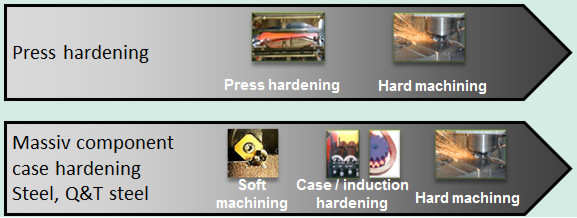- FE-modeling of machining processes in 2D considering components conditions linking to adjacent sub production chain
- FE-modeling of machining processes in 3D
Simulations study of the process parameters considering different initial states
- Analysis of the geometry change using a replacement model
|
- Simulative prediction of distortion release during machining as a function of upstream sub-processes (case-, induction- and press hardening)
- Development of compensation (strategies) for optimal distortion hard machining
|


